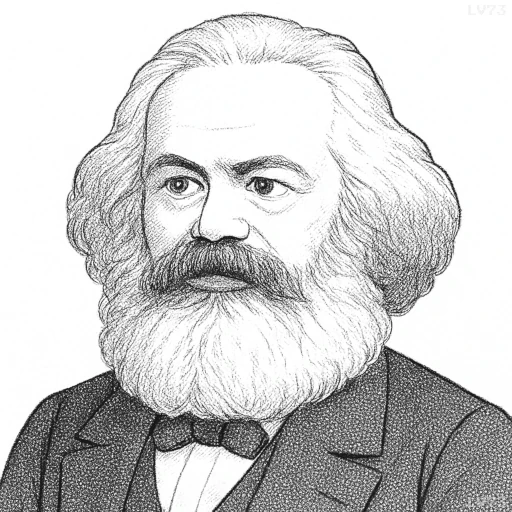“It is not history which uses men as a means of achieving – as if it were an individual person – its own ends. History is nothing but the activity of men in pursuit of their ends.”

- May 5, 1818 – March 14, 1883
- Born in the Kingdom of Prussia (Germany)
- Philosopher, economist, political thinker
table of contents
Quote
“It is not history which uses men as a means of achieving – as if it were an individual person – its own ends. History is nothing but the activity of men in pursuit of their ends.”
Explanation
In this quote, Marx emphasizes that history is not an external, impersonal force that acts upon people, shaping events according to some predetermined plan or grand purpose. Rather, history is made by human beings—it is the result of individuals and groups acting to pursue their own goals, interests, and needs. Marx rejects the idea that history follows a set course or that it is controlled by abstract forces or ideas. Instead, he argues that social change occurs through the collective actions of people, as they strive to shape their material conditions and pursue their own objectives. This view aligns with Marx’s materialist conception of history, which suggests that economic forces, class struggles, and the material conditions of life are the primary drivers of historical development, rather than any abstract, external force.
Historically, Marx’s statement challenges the idea that history is deterministic or that events unfold according to some predetermined logic, such as in the philosophies of history put forward by thinkers like Hegel. Hegel, for instance, viewed history as a progression of ideas or a spiritual process through which human consciousness unfolds. In contrast, Marx believed that history is driven by material conditions and the struggles of human beings to meet their basic needs—especially in relation to the ownership of the means of production and class relations. Marx’s view stresses that humans are not passive observers of history, but active agents who, through their collective action, influence the course of events.
In modern contexts, this quote serves as a reminder that social change is not something that happens by chance or by the will of some larger abstract force, but through human action—particularly the actions of oppressed groups who strive for justice, equality, and freedom. Today, movements for civil rights, labor rights, and environmental justice continue to demonstrate that history is shaped by the efforts of ordinary people working together to change the structures that govern society. Marx’s statement encourages us to recognize that individual and collective efforts can transform society, and that we are not merely passive recipients of history’s outcomes, but active participants in shaping it.
Would you like to share your impressions or related stories about this quote in the comments section?
